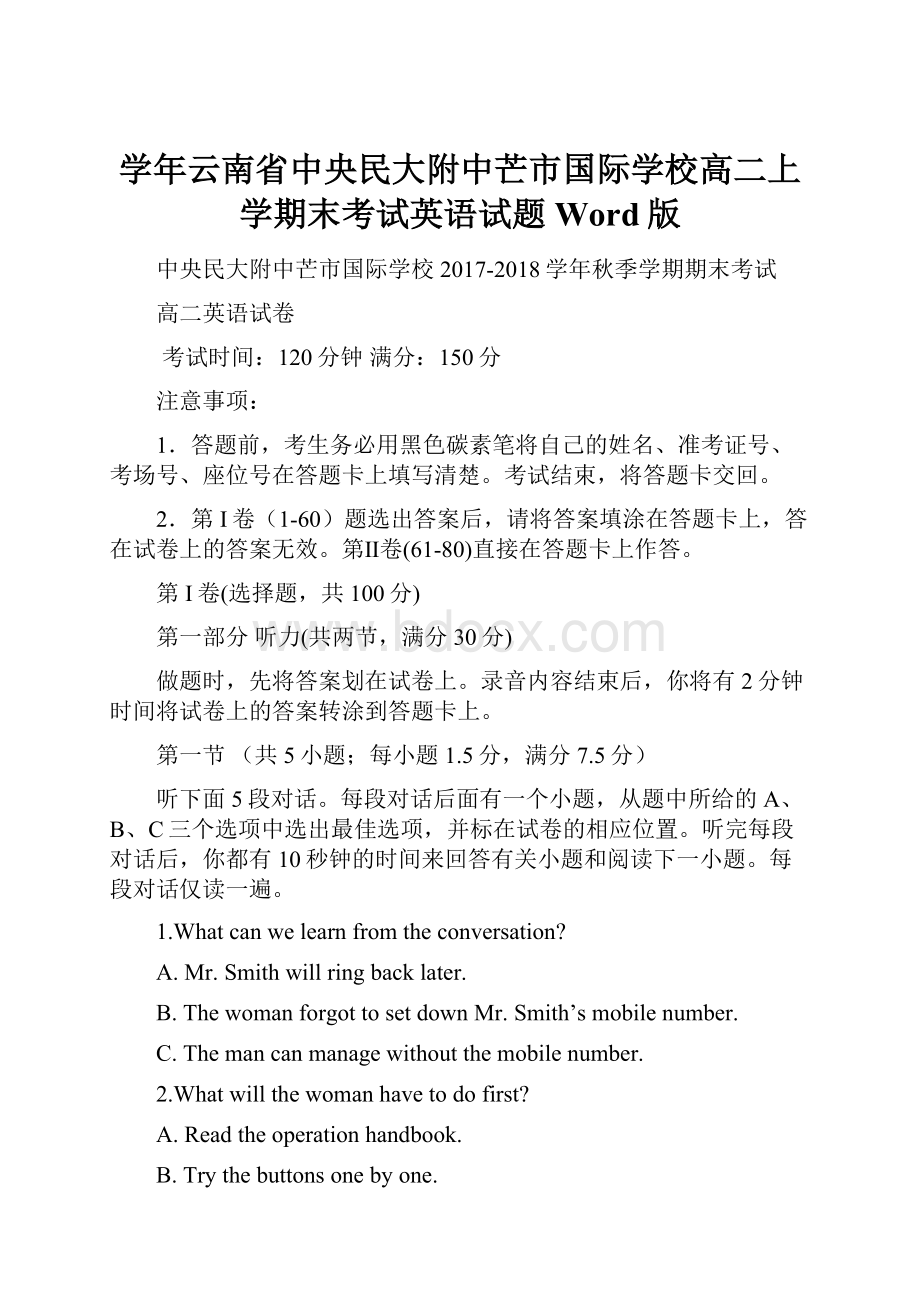学年云南省中央民大附中芒市国际学校高二上学期末考试英语试题 Word版.docx
《学年云南省中央民大附中芒市国际学校高二上学期末考试英语试题 Word版.docx》由会员分享,可在线阅读,更多相关《学年云南省中央民大附中芒市国际学校高二上学期末考试英语试题 Word版.docx(18页珍藏版)》请在冰豆网上搜索。

学年云南省中央民大附中芒市国际学校高二上学期末考试英语试题Word版
中央民大附中芒市国际学校2017-2018学年秋季学期期末考试
高二英语试卷
考试时间:
120分钟满分:
150分
注意事项:
1.答题前,考生务必用黑色碳素笔将自己的姓名、准考证号、考场号、座位号在答题卡上填写清楚。
考试结束,将答题卡交回。
2.第I卷(1-60)题选出答案后,请将答案填涂在答题卡上,答在试卷上的答案无效。
第Ⅱ卷(61-80)直接在答题卡上作答。
第I卷(选择题,共100分)
第一部分听力(共两节,满分30分)
做题时,先将答案划在试卷上。
录音内容结束后,你将有2分钟时间将试卷上的答案转涂到答题卡上。
第一节(共5小题;每小题1.5分,满分7.5分)
听下面5段对话。
每段对话后面有一个小题,从题中所给的A、B、C三个选项中选出最佳选项,并标在试卷的相应位置。
听完每段对话后,你都有10秒钟的时间来回答有关小题和阅读下一小题。
每段对话仅读一遍。
1.Whatcanwelearnfromtheconversation?
A.Mr.Smithwillringbacklater.
B.ThewomanforgottosetdownMr.Smith’smobilenumber.
C.Themancanmanagewithoutthemobilenumber.
2.Whatwillthewomanhavetodofirst?
A.Readtheoperationhandbook.
B.Trythebuttonsonebyone.
C.Havethemachinerepaired.
3.Howwillthemanprobablygodowntown?
A.Bytaxi.B.Bybus.C.Onfoot.
4.Whydidn’tJackgetthebook?
A.Hewastoobusytogotothelibrary.
B.Therewasn’tsuchabookinthelibrary.
C.Hedidn’twanttoborrowthebook.
5.Whatdidthewomanwantthemantodo?
A.Togoalongtomeetherfriendwithher.
B.Todothewoman’swork.
C.TomeetTonyforher.
第二节(共15小题;每小题1.5分,满分22.5分)
听下面5段对话或独白。
每段对话或独白后有几个小题,从题中所给的A、B、C三个选项中选出最佳选项,并标在试卷的相应位置。
听每段对话或独白前,你将有时间阅读各个小题,每小题5秒钟;听完后,各小题将给出5秒钟的作答时间。
每段对话或独白读两遍。
听第6段材料,回答第6~7小题。
6.Whatdidthewomanbuyasherhusband’sbirthdaypresent?
A.Ahat.B.Atie.C.Ashirt.
7.Whydidtheassistantrefusetohelpthewoman?
A.Becausethewomandidn’tshowhimthereceipt.
B.Becausethethingshewantedtochangehadbeenworn.
C.Becausethewomantoldalie.
听第7段材料,回答第8~10小题。
8.WheredidSuespendthenightsinthecountry?
A.Inafarmhouse.B.Intheopen.C.Atahotel.
9.Whatwastheweatherlikeinthecountry?
A.Therewasalotofsunshine.
B.Itrainednearlyeveryday.
C.Itsnowedalot.
10.WhatdidSuethinkofthepeopleinthecountry?
A.Theywerefriendly.
B.Theywerestrange.
C.Theyweretall.
听第8段材料,回答第10~13小题。
11.Whatarethespeakersmainlytalkingabout?
A.Buyingthebooksfortheircourse.
B.Themoneyneededforthebooks.
C.Sharingthebookswitheachother.
12.WhydoesDr.Downswanthisstudentstohavethesefivebooks?
A.Thesebooksarenotexpensive.
B.Hewantshisstudentstoreadmore.
C.Hewantstodiscussthemindetail.
13.Howdoesthewomanplantosolvetheproblemsaboutthebooks?
A.Shebuysthreeandthemanbuystwo.
B.Shepaysthemanfiftydollarsforsharing.
C.Theyeachpayhalfofthetotalamountforthebooks.
听第9段材料,回答第14~17小题。
14.WhenwillthemanandTracymeet?
A.At6:
30.B.At7:
00.C.At7:
30.
15.Whatfilmdoesn’tthewomanlike?
A.Detectivefilms.
B.Filmsaboutlove.
C.Horrorfilms.
16.Whatmightthemandotomorrow?
A.Gotothestudio.B.Seeafilm.C.Dosomereading.
17.Whenwillthemanletthewomanknowthefirstthing?
A.Tomorrowafternoon.B.Tonight.C.Tomorrowmorning.
听第10段材料,回答第18~20小题。
18.Whereisthespeakerstayingnow?
A.InEngland.B.InAmerica.C.InChina.
19.HowoftendoesthespeakergotoSoho?
A.Onceaweek.B.Twiceaweek.C.Threetimesaweek.
20.WhatisherEnglishfriendinterestedin?
A.Eatingfood.
B.Takingatrip.
C.Mountainclimbing.
第二部分阅读理解(共两节,满分40分)
第1节(共15小题;每小题2分,满分30分)
阅读下列短文,从每题所给的四个选项(A、B、C和D)中,选出最佳选项。
A
IntheUnitedStates,whenonebecomesrich,hewantspeopletoknowit.Andevenifhedoesnotbecomeveryrich,hewantspeopletothinkthatheis.Thatiswhat‘keepingupwiththeJoneses’isabout.Itisthestoryofsomeonewhotriedtolookasrichashisneighbors.
Theexpressionwasfirstusedin1913byayoungAmericancalledArthurMomand.Hetoldthisstoryabouthimself.Hebeganearning$125aweekattheageof23.Thatwasalotofmoneyinthosedays.HegotmarriedandmovedwithhiswifetoaverywealthyneighbourhoodoutsideNewYorkCity.Whenhesawthatrichpeoplerodehorses,Momandwenthorsebackridingeveryday.Whenhesawthatrichpeoplehadservants.Momandandhiswifealsohiredaservantandgavebigpartiesfortheirnewneighbors.
Itwaslikearace,butonecouldneverfinishthisracebecauseonewasalwaystryingtokeepup.TheraceendedforMomandandhiswifewhentheycouldnolongerpayfortheirnewwayoflife.Theymovedbacktoanapartment(公寓房间)inNewYorkCity.
Momandlookedaroundhimselfandnoticedthatmanypeopledothingsjusttokeepupwithrichlife--styleoftheirneighbors.Hesawthefunnysideofitandstartedtowriteaseries(系列)ofshortstories,Hecalledit‘KeepingupwiththeJoneses’because‘Jones’isaverycommonnameintheUnitedStates.‘KeepingupwiththeJoneses’cametomeankeepingupwithrichlifestyleofthepeoplearoundyou.Momand’sseriesappearedindifferentnewspapersacrossthecountryforover28years.
PeopleneverseemtogettiredofkeepingupwiththeJoneses.Andthereare‘Jonses’ineverycityoftheworld.ButonemustgettiredoftryingtokeepupwiththeJonesesbecausenomatterwhatonedoes,Mr.Jonesalwaysseemstobeahead.
21.SomepeoplewanttokeepupwiththeJonesesbecausethey______.
A.wanttobeasrichastheirneighbors.
B.wantotherstoknowortothinkthattheyarerich.
C.don’twantotherstoknowtheyarerich.
D.wanttobehappy.
22.Theunderlinedword“neighbourhood”inthesecondparagraphmeans“________”.
A.apersonwholivesnearanother.B.peoplelivinginanarea.
C.anareaneartheplacereferredto.D.anareainanothertownorcity.
23.ArthurMomandusedthename‘Jones’inhisseriesofshortstoriesbecause‘Jones’is________.
A.animportantname.B.apopularnameintheUnitedStates.
C.hisneighbor’sname.D.notagoodname.
B
Dodogsunderstandus?
Becarefulwhatyousayaroundyourdog.Itmightunderstandmorethanyouthink.
AbordercollienamedRicorecognizesthenamesofabout200objects,sayresearchersinGermany.Thedogalsoappearstobeabletolearnnewwordsaseasilyasa3-year-oldchild.Itsword-learningskillsareasgoodasthoseofaparrotorchimpanzee(黑猩猩).
Inoneexperiment,theresearcherstookall200itemsthatRicoissupposedtoknowanddividedtheminto20groupsof10objects.Thentheownertoldthedogtogoandfetchoneoftheitemsandbringitback.Infourtests,Ricogot37outof40commandsright.Asthedogcouldn'tseeanyonetogetclues,thescientistsbelieveRicomustunderstandthemeaningsofcertainwords.
Inanotherexperiment,thescientiststookonetoythatRicohadneverseenbeforeandputitinaroomwithseventoyswhosenamesthedogalreadyknew.TheownerthentoldRicotofetchtheobject,usingawordthedoghadneverheardbefore.
Thecorrectobjectwaschoseninsevenoutofl0tests,suggestingthatthedoghadworkedouttheanswerbyprocessofelimination(排除法).Amonthlater,Ricorememberedhalfofthenewnames,whichisevenmoreimpressive.
Ricoisthoughttobesmarterthantheaveragedog.Foronething,Ricoisabordercollie,abreed(品种)knownforitsmentalabilities.Inaddition,the9-year-olddoghasbeentrainedtofetchtoysbytheirnamessincetheageofninemonths.
It'shardtoknowifalldogsunderstandatleastsomeofthewordswesay.Eveniftheydo,theycan'ttalkback.Still,itwouldn'thurttosweet-talkyourdogeverynowandthen.Youmightjustgetabig,wetkissinreturn!
24.Fromparagraph2,weknowthat.
A.animalsareascleverashumanbeings.
B.dogsaresmarterthanparrotsandchimpanzees.
C.chimpanzeeshavegoodword-learningskills.
D.dogshavesimilarlearningabilitiesas3-year-oldchildren
25.Bothexperimentsshowthat.
A.Ricoissmartenoughtogetallcommandsright.
B.Ricocanrecognizedifferentthingsincludingtoys.
C.Ricohasdevelopedtheabilityoflearningmathematics.
D.Ricowon'tforgetthenamesofobjectsoncerecognizingthem.
26.WhichofthefollowingstatementsisTRUE?
A.Thepurposeoftheexperimentsistoshowthebordercollie'smentalabilities.
B.Ricohasabettermemorypartlybecauseofitsproperearlytraining.
C.Thebordercollieisworld-famousforrecognizingobjects.
D.Ricoisborntounderstanditsowner'scommands.
27.Whatdoesthewriterwanttotellus?
A.Totrainyourdog.B.Totalktoyourdog.
C.Tobefriendlytoyourdog.D.Tobecarefulwithyourdog.
C
NOTallmemoriesaresweet.Somepeoplespendalltheirlivestryingtoforgetbadexperiences.Violenceandtrafficaccidentscanleavepeoplewithterriblephysicalandemotionalscars.Oftentheyrelivetheseexperiencesinnightmares.
NowAmericanresearchersthinktheyareclosetodevelopingapill,whichwillhelppeopleforgetbadmemories.Thepillisdesignedtobetakenimmediatelyafterafrighteningexperience.Theyhopeitmightreduce,orpossiblyerase(抹去)theeffectofpainfulmemories.
InNovember,expertstestedadrugonpeopleintheUSandFrance.Thedrugstopsthebodyreleasingchemicalsthatfixmemoriesinthebrain.Sofartheresearchhassuggestedthatonlytheemotionaleffectsofmemoriesmaybereduced,notthatthememoriesareerased.
Theresearchhascausedagreatdealofargument.Somethinkitisabadidea,whileotherssupportit.
Supporterssayitcouldleadtopillsthatpreventortreatsoldiers'troublingmemoriesafterwar.Theysaythattherearemanypeoplewhosufferfromterriblememories.
"Somememoriescanruinpeople'slives.Theycomebacktoyouwhenyoudon'twanttohavetheminadaydreamornightmare.Theyusuallycomewithverypainfulemotions,"saidRogerPitman,aprofessorofpsychiatryatHarvardMedicalSchool."Thiscouldrelievealotofthatsuffering."
Butthosewhoareagainsttheresearchsaythatchangingmemoriesisverydangerousbecausememoriesgiveusouridentity(特质).Theyalsohelp